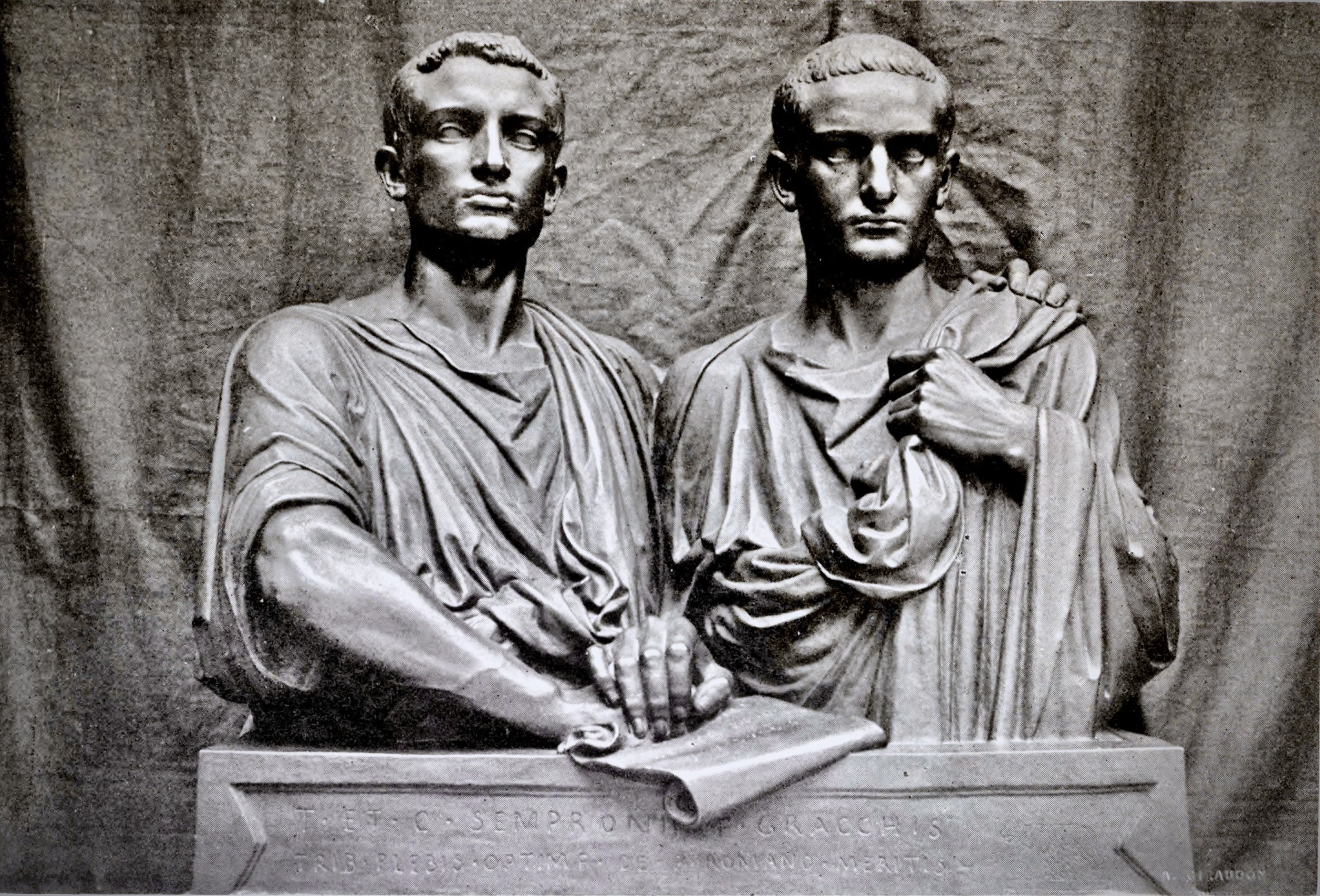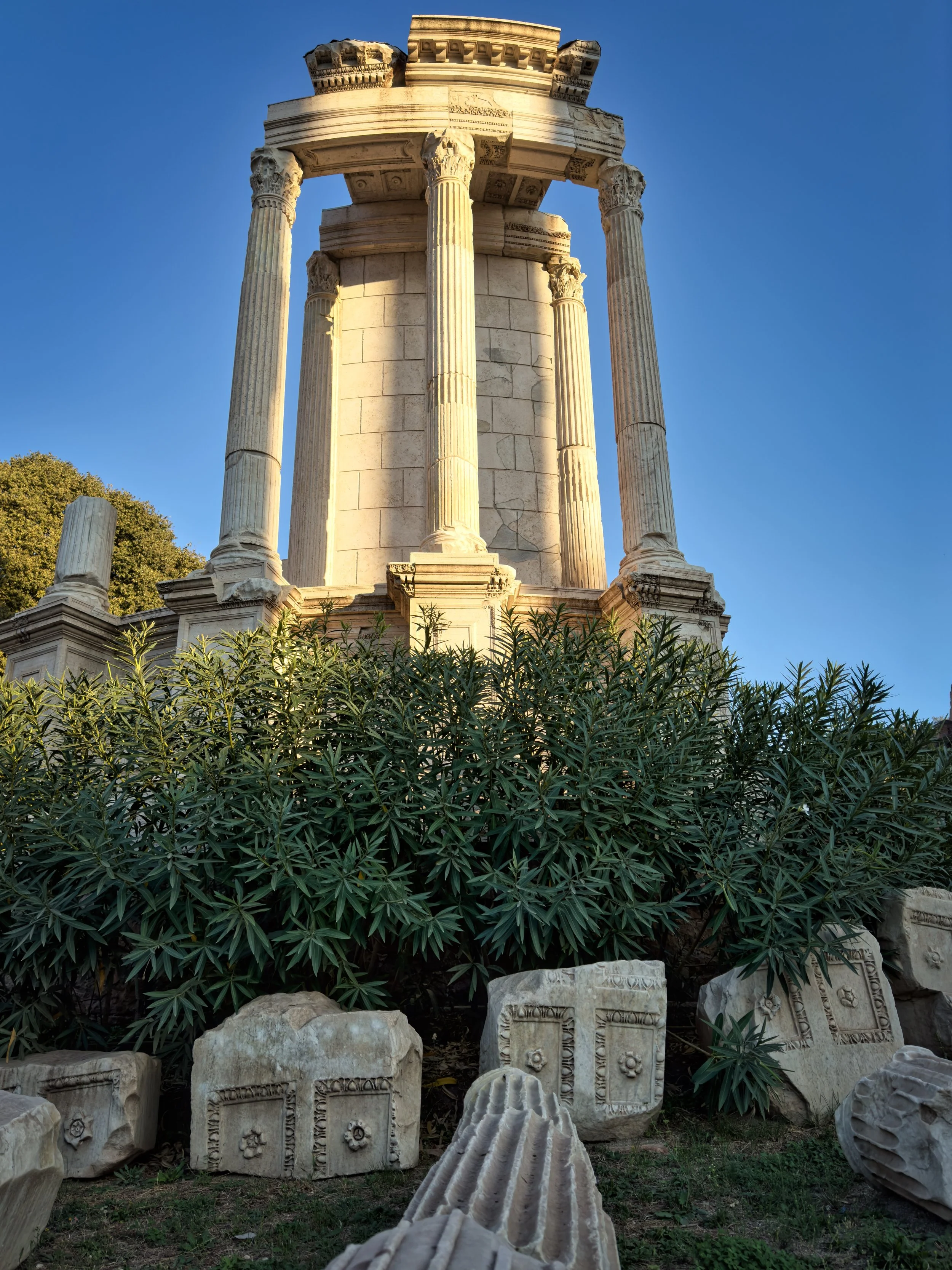TIBERIUS GRACCHUS - PART II
The Gracchi Brothers
When last we left our hero, Tiberius Gracchus, it was 133 BC, and he was trying to pass a land reform bill that would reward veterans with public lands. This was a popular move with the masses, the populari. He met fierce opposition, though, from the wealthy elites, the optimates. The people’s Assembly had reached an impasse. Marcus Octavius had vetoed Tiberius’ bill, and Tiberius vetoed all other legislation. Rome simmered under the dysfunction.
Then Tiberius took an even more drastic step. He proposed the impeachment of Octavius and his removal as a Tribune of the Plebes. Tiberius argued, not incorrectly, that Marcus had betrayed the trust put in him by the populari. By removing this obstacle, the land reform bill could be made law.
The Forum, site of much Gracchi drama, is also the home of the Temple of Vesta. The Vestal Virgins tended the hearth and wielded unusal influence for women at the time. They answered to the Pontifex Maximus and very few others.
While this impeachment wasn’t illegal, it had never been done before - no Tribune had ever been forcibly removed from office. Even some of Tiberius’ supporters thought it was a bridge too far. But Tiberius was nothing if not driven. He forged ahead with the impeachment to the horror of the Senate and optimates.
Tiberius’ passion was felt among his legion of remaining supporters. Here he took another drastic step - or, rather, refused to: his zealots formed themselves into gangs, using violence and intimidation to coerce Assembly members who may be on the fence about the impeachment, and to harass the optimates who resisted the move in droves.
While violence wasn’t unknown in Roman politics, it had largely been limited to assassinations or brawls on the Senate floor. This marked the first time that systemic violence infected the Roman body politic. It would not be the last.
Having secured enough votes to remove Octavius, Tiberius made this known and gave the defiant Tribune one last chance to relent. Marcus refused and was duly impeached by the Assembly, barely escaping the violent mob of Tiberius’s supporters with his life.
With Marcus Octavius removed, Tiberius once again proposed the Lex Agraria to the Assembly and with an overwhelming majority, it passed.
But the cost was high. The removal of Octavius was effectively a declaration of civil war on the optimates. Coupled with the increase in violence for political aims, Rome was ready to explode.
But it didn’t, at least not yet. The Lex Agraria established a land commission of 3 men to assess and reallocate public lands land to veterans. This committee needed money to do its work, however, and guess who controlled the purse. The Senate, of course.
Seizing their opportunity, the Senate approved a risible amount of money to fund the commission, effectively rendering it useless. They were powerless to stop the law from taking effect, but they could deny it any funds. The optimates began to bask in victory.
But in one of those strange twists of fate that often drive history, something amazing happened in the East. The King of Pergamon (modern-day Turkey) had been a longtime friend to Rome. He died suddenly and in a stunning turn, willed his entire kingdom and fortune “to the people of Rome.” Tiberius immediately jumped on this opportunity to claim those vast funds for his commission, citing the fact that the monies weren’t willed to the Senate, but to the people. The Senate was incensed by this claim and began organizing their own supporters to prevent Tiberius from acquiring any of the endowment.
Early Renaissance depiction of the last king of Rome, Tarquinus Superbus, whose disastrous reign turned Romans off kingship forever. He’s pictured here after whacking the tops of tall flowers with a stick. (It’s a long story)
As this struggle continued, Tiberius would take one final, drastic step to enforce his law. Since the funding was still contested and his annual term as Tribune was nearing its end, he needed more time to enforce his law, so he did something unthinkable: he announced his intention to run for re-election.
While a Tribune could serve multiple terms, it had never occurred in back to back years. As with most of Tiberius’ actions, this wasn’t illegal, but blew up the social norms. His intention was viewed by the optimates as an unprecedented power grab. In their eyes, Tiberius was intent on being the one thing no Roman could countenance: a king. The republic was founded on the ashes of the monarchy, after the brutal reign of the last king, Tarquinius Superbus. Romans were so resolute against one-man rule that the Latin word for king, rex, was effectively banned.
It was now 132 BC and the Assembly had gathered to elect the new tribunes. The gathering was chaotic with populari and optimates in attendance. Scuffles broke out. Violence was in the air. Seeing this unrest, Tiberius was on the speaker’s platform and pointed to his head. This motion signaled to his supporters that he feared for his life.
At this point, it’s worth mentioning that magistrates and tribunes were sacrosanct - their persons were inviolable. Any harm done to them was punishable by a swift death. It wasn’t only a crime to strike a magistrate, it was sacrilege. Thus was the following development all the more shocking. The chief priest of Rome was the Pontifex Maximus. He oversaw religious rituals and managed the Vestal Virgins. At this time, the office was held by a Senator named Cornelius Scipio Nasica, a first cousin to Tiberius. However, no familial love was lost here. An optimate to the core, and one who stood to lose land as a result of passage of the Lex Agraria, Nasica was a natural adversary to his reform-minded cousin. Upon receiving word that Tiberius had motioned towards his head, Nasica misinterpreted this gesture as Tiberius’ intent to crown himself king. This would not stand. With a rousing speech about saving the Republic, Nasica mobilized Senators to confront Tiberius. They would solve this problem once and for all.
Publius Cornelius Scipio Nasica. PCSN for short?
Upon arriving at the Assembly, the mob of Senators with Nasica at the head. It was customary to give way to a high religious official, so Nasica, decked out in his high religious regalia, easily led the mob through the crowd. At this point, these men of wealth and esteem went berserk. They began smashing chairs and benches, then wielded the broken pieces as weapons. They attacked the populari indiscriminately, killing as many as 300. Then they set their sights on Tiberius.
The tribune tried to escape but tripped over the body of a dead plebe. The murderous Senators pounced, overwhelmed Tiberius, and in a bloody frenzy, beat him to death.
Thus ended the life of Tiberius Sempronius Gracchus. He was either in his late 20s or early 30s, but in that short time made an indelible mark on Rome. Though he was dead, his legacy would endure for millennia.
Continued and concluded in Part III. And I’ll tell you why I think, despite his flaws, Tiberius Gracchus is one of Rome’s greatest heroes.





